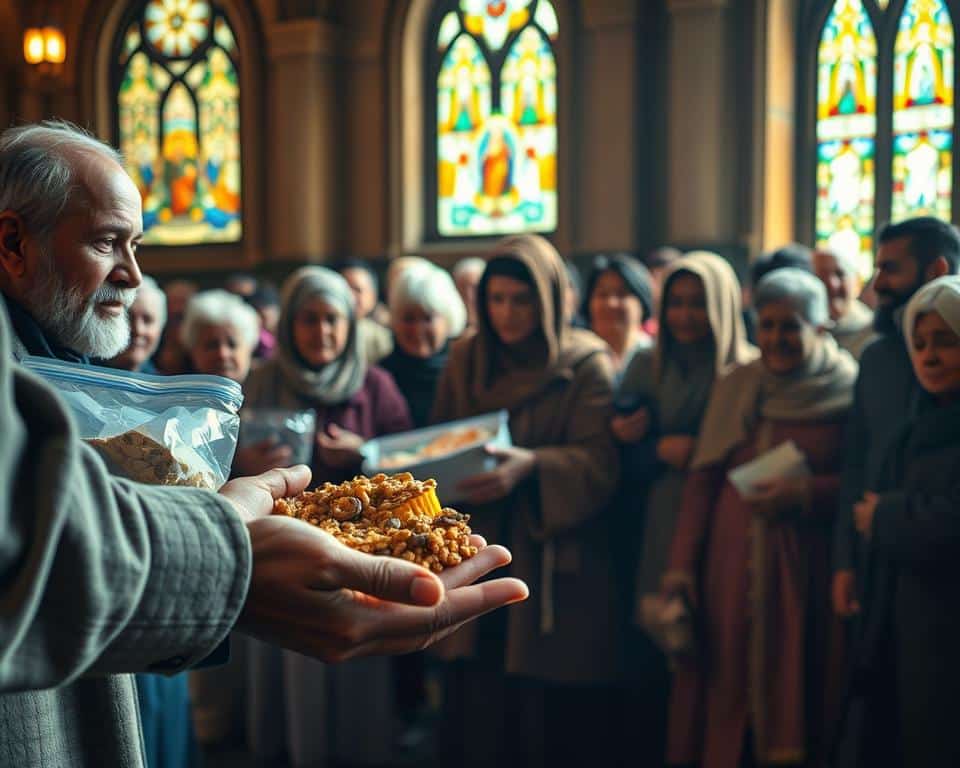Have you ever wondered why giving feels so good? The Bible teaches that generosity is more than just an act—it’s a way of life rooted in faith. Jesus set the ultimate example by giving His all, showing us that true generosity comes from the heart.
Generosity isn’t limited to money. It’s about sharing your time, love, and resources with others. The Bible reminds us in Acts 20:35 that “It is more blessed to give than to receive.” This principle brings joy not only to the receiver but also to the giver.
When we give freely, we reflect God’s love and grace. It’s a powerful way to impact the world and grow in faith. Let’s explore how living generously can transform your life and the lives of those around you.
Understanding Biblical Generosity
What does it truly mean to give from the heart? Biblical generosity is about more than just money. It’s a way of life that reflects God’s love and grace. When we give freely, we share not only our resources but also our time, love, and support.

Generosity in the Bible is rooted in a surrendered heart. It’s about trusting God with everything we have. From the widow’s offering of two small coins to Zacchaeus giving half his wealth, Scripture shows us that giving is an act of faith and obedience.
Defining Generosity in a Christian Context
Generosity is not limited to material gifts. It includes sharing your time, talents, and even a kind word. The Bible teaches that everything we have comes from God. When we give, we acknowledge His provision and share His blessings with others.
Biblical Verses That Inspire Giving
Here are a few verses that highlight the importance of generosity:
- 2 Corinthians 9:7: “Each of you should give what you have decided in your heart to give, not reluctantly or under compulsion, for God loves a cheerful giver.”
- Acts 20:35: “It is more blessed to give than to receive.”
- Matthew 6:21: “For where your treasure is, there your heart will be also.”
These verses remind us that generosity is a reflection of our faith. It’s not about the amount but the heart behind the gift. When we give, we mirror the selfless love of Jesus.
Take time to explore the Bible for more inspiration. Let the stories of giving in Scripture guide you to live a life of generosity. It’s a powerful way to impact the world and grow closer to God.
Christian Perspective on Generosity
How can we truly follow Jesus’ example in our daily lives? His life was a perfect model of selfless giving, showing us what it means to live with compassion and love. From healing the sick to feeding the hungry, Jesus consistently put others’ needs above His own.

Jesus’ ministry was filled with acts of kindness that reflected God’s love. He reached out to the outcasts, showed mercy to the broken, and gave His time and energy to those in need. His actions remind us that generosity is not just about money—it’s about sharing our hearts and resources with others.
One powerful example is found in Matthew 14:13-21, where Jesus fed thousands with just five loaves and two fish. This miracle wasn’t just about food; it was a lesson in trusting God and caring for others. When we follow His example, we can bring hope and joy to the world.
Living generously starts with a simple question: How can I show love to someone today? Whether it’s through a kind word, a helping hand, or a thoughtful gift, every act of generosity reflects the heart of Jesus. Let His life inspire you to give freely and live fully.
Jesus’ Example of Generosity
How did Jesus show us the way to true generosity? His life was a living example of selfless giving, rooted in love and compassion. From healing the sick to feeding the hungry, Jesus demonstrated that generosity is about more than material things—it’s about meeting the needs of others.
One of the most powerful examples is found in Matthew 14:13-21, where Jesus fed thousands with just five loaves and two fish. This miracle wasn’t just about food; it was a lesson in trusting God and caring for those in need. Jesus showed that even the smallest resources, when given with a willing heart, can make a big impact.
Acts of Compassion and Service
Jesus’ ministry was filled with acts of kindness. He healed the sick, comforted the brokenhearted, and reached out to those who were marginalized. These actions remind us that generosity is about more than money—it’s about sharing our time, talents, and love with others.
For instance, when Jesus encountered a woman caught in sin, He didn’t condemn her. Instead, He offered forgiveness and a new beginning. This act of grace shows us that true generosity includes extending mercy to those who don’t deserve it.
Teaching on Forgiveness and Sacrifice
Jesus also taught the importance of forgiveness and sacrifice. In Luke 23:34, even as He was crucified, Jesus prayed, “Father, forgive them, for they do not know what they are doing.” This ultimate act of selflessness shows us that generosity isn’t always easy, but it’s always worth it.
His teachings remind us that giving isn’t just about what we have—it’s about who we are. When we follow His example, we reflect God’s love to the world. Every act of kindness, no matter how small, can bring hope and joy to someone in need. By embodying the principles of kindness in Christianity, we create a ripple effect that encourages others to act with compassion. Each generous gesture not only uplifts those around us but also strengthens our own character. Ultimately, our commitment to kindness transforms communities, fostering a spirit of love and unity.
Take a moment to reflect: How can you show generosity today? Whether it’s through a kind word, a helping hand, or a thoughtful gift, your actions can make a difference. Let Jesus’ life inspire you to give freely and live fully.
Generosity Beyond Material Wealth
Why is giving more than just about money? True generosity goes beyond financial gifts. It’s about sharing your time, love, and emotional support with others. When you give in these ways, you reflect the heart of God and make a lasting impact.
Think about the ways you can give without spending a dime. Offering your time to help someone in need, listening to a friend, or sharing your talents can be just as meaningful as a monetary gift. These acts of kindness build stronger communities and bring joy to both the giver and the receiver.
Generosity is also about recognizing the value of relationships. When you prioritize people over possessions, you create a culture of compassion. Jesus showed us this through His actions—He gave His time, attention, and care to those around Him. Follow His example by looking for opportunities to give in creative ways.
Here are a few ideas to inspire you:
- Volunteer at your local church or community center.
- Offer to mentor someone who could benefit from your experience.
- Share a kind word or a smile with someone who needs encouragement.
Every resource you share, whether it’s your skills, attention, or love, contributes to a more compassionate world. A generous heart values service and relationships over material accumulation. Start today by finding small ways to give beyond wealth and see how it transforms your life and the lives of others.
Scriptural Guidance on Giving
What does Scripture teach us about the heart of giving? The Bible provides clear instructions on how to live generously, both in the Old and New Testaments. These teachings guide us to give not out of obligation but from a willing heart that reflects God’s love.
Old Testament Instructions on Freewill Offerings
In the Old Testament, God encouraged His people to give freely and joyfully. Freewill offerings were gifts given beyond the required tithe, symbolizing a heart of gratitude and trust. For example, in Deuteronomy 16:10, God instructs, “Each of you must bring a gift in proportion to the way the Lord your God has blessed you.”
These offerings were not just about money but also about resources like grain, livestock, and time. The act of giving was a way to honor God and support the community, especially those in need.
New Testament Insights on Sharing
The New Testament builds on these principles, emphasizing generosity as a way of life. Jesus taught that giving should come from a place of love and compassion. In Luke 6:38, He said, “Give, and it will be given to you. A good measure, pressed down, shaken together and running over, will be poured into your lap.”
Paul also encouraged believers to share their resources with others. In 2 Corinthians 9:7, he wrote, “Each of you should give what you have decided in your heart to give, not reluctantly or under compulsion, for God loves a cheerful giver.”
Here are key principles from Scripture to guide your giving:
- Give willingly and joyfully, not out of obligation.
- Share your time, talents, and resources with those in need.
- Trust that God will provide as you give generously.
By following these teachings, you can live a life of generosity that honors God and blesses others. Let His word inspire you to give with a cheerful heart and make a difference in your community and the kingdom.
The Transformative Impact of Generosity
Have you considered how giving can change your life? Generosity isn’t just about what you give—it’s about the joy and transformation it brings. When you give freely, you experience a deeper connection to God and others. It’s a powerful way to reflect His love and make a lasting impact.
Generosity transforms both the giver and the recipient. It creates a cycle of joy that uplifts everyone involved. Many people share stories of unexpected delight when they give their time, resources, or even a kind word. These small acts can change lives and strengthen community bonds.
Experiencing Joy Through Giving
Giving isn’t just about material things. It’s about sharing your heart and making a difference. When you give, you often receive more than you expect—joy, fulfillment, and a sense of purpose. Here’s how generosity can transform your life:
- Unexpected Joy: Many find that giving brings unexpected happiness. Whether it’s helping someone in need or volunteering at your church, these acts create a sense of fulfillment.
- Spiritual Uplift: Generosity deepens your faith. It reminds you that everything you have comes from God and encourages you to trust Him more.
- Community Bonds: Small acts of kindness strengthen relationships. They show others that they are valued and loved.
Living generously isn’t just about what you give—it’s about who you become. It’s a pathway to a more fulfilled existence. Every act of kindness, no matter how small, contributes to a cycle of mutual encouragement and hope. Start today by finding ways to give, and see how it transforms your life and the lives of others.
Tithing and Freewill Offerings in Scripture
What does the Bible say about giving back to God? Tithing and freewill offerings are two key practices that reflect our faith and gratitude. These acts of giving are not just about money but about honoring God and supporting His work.
Tithing is a biblical mandate, often described as giving a tenth of our income. In Leviticus 27:30, it says, “A tithe of everything from the land, whether grain from the soil or fruit from the trees, belongs to the Lord.” This practice supports the local church and its ministries, ensuring that the needs of the community are met.
Freewill offerings, on the other hand, go beyond the tithe. They are expressions of extra generosity, given freely and joyfully. 2 Corinthians 9:7 reminds us, “Each of you should give what you have decided in your heart to give, not reluctantly or under compulsion, for God loves a cheerful giver.” These offerings help those in need and further God’s work in the world.
Here are some key points to remember about tithing and freewill offerings:
- Tithing is a way to honor God and support the church.
- Freewill offerings are a personal expression of generosity.
- Both practices reflect gratitude for God’s blessings.
Giving is not just an obligation; it’s a way to deepen your faith. When you give, you acknowledge that everything you have comes from God. Start today by considering how you can honor Him through your resources and time.
Cultural Influences on Financial Stewardship
How does culture shape the way we handle money and giving? In a world that often values accumulation over sharing, it’s easy to feel pressured to prioritize wealth. Yet, the Bible calls us to a different way—one rooted in trust and moderation.
Materialism and consumer culture can challenge a generous heart. Advertisements, social media, and peer influence often push us to desire more. But biblical stewardship reminds us that true wealth isn’t measured by possessions. It’s found in our relationship with God and how we use our resources to bless others.
Trusting in God’s provision can help us overcome the urge for “more.” Proverbs 11:24 says, “One person gives freely, yet gains even more; another withholds unduly but comes to poverty.” This reminds us that generosity leads to joy and abundance, not lack.
Overcoming the Culture of More
Media and peers subtly shape our financial decisions. The desire for the latest gadgets or trends can distract us from eternal values. But Philippians 4:11-13 teaches us to find contentment in every circumstance. This mindset helps us resist the culture of excess.
Here are ways to align your financial choices with biblical principles:
- Prioritize giving to your church and those in need.
- Reflect on your spending habits and identify areas of excess.
- Focus on building relationships rather than accumulating wealth.
Living generously isn’t about how much you have but how you use what you’ve been given. By trusting God and focusing on His kingdom, you can overcome cultural pressures and experience the joy of true generosity.
The Gift of Salvation and Its Generous Call
What does it mean to receive the greatest gift of all? Salvation is the ultimate demonstration of God’s generosity. It’s a gift freely given, not earned or deserved. This act of love redefines what it means to give and calls us to live with a generous heart.
Jesus’ sacrifice on the cross is the supreme example of generosity. He gave His life so that we could have eternal life. As John 3:16 says, “For God so loved the world that He gave His one and only Son, that whoever believes in Him shall not perish but have eternal life.” This verse reminds us that true generosity is rooted in selfless love.
Salvation isn’t just a gift; it’s a call to action. It invites us to respond with gratitude and generosity. When we understand the depth of God’s love, we’re inspired to share that love with others. Every act of kindness, every resource shared, becomes a reflection of His grace.
Salvation as the Ultimate Example of Giving
Jesus’ sacrifice shows us the true meaning of generosity. He gave everything, even His life, to meet our greatest need. This act of love sets a pattern for how we should live. It challenges us to give freely, not out of obligation, but from a place of love and gratitude. By embracing this model of selflessness, we discover the profound impact of service and compassion in our communities. Understanding Christian ethics encourages us to prioritize the needs of others, fostering a spirit of unity and support. As we reflect on Jesus’ example, we are inspired to extend our hands and hearts, creating a ripple effect of generosity in our world.
Salvation also transforms us. It changes our heart and shifts our focus from accumulating wealth to building God’s kingdom. As 2 Corinthians 9:7 reminds us, “Each of you should give what you have decided in your heart to give, not reluctantly or under compulsion, for God loves a cheerful giver.”
Reflect on the power of God’s gift. Let it inspire you to live generously. Whether it’s through your time, talents, or resources, every act of giving can bring joy and hope to someone in need. Salvation is not just a gift to receive—it’s a call to give.
Practical Ways to Live Generously
How can you make generosity a part of your everyday life? Living generously doesn’t require grand gestures. It’s about small, intentional acts that reflect God’s love and care for others. Whether it’s sharing your resources, time, or talents, every act of kindness makes a difference.
Providing for Those in Need
One of the simplest ways to live generously is by meeting the needs of others. This could mean donating to a local food bank, helping a neighbor with groceries, or supporting a family facing financial hardship. Even small contributions can bring joy and relief to someone in need.
Consider these ideas:
- Donate to organizations that serve your community.
- Offer to pay for a meal or utility bill for someone struggling.
- Share extra clothing or household items with those who could use them.
Sharing Time and Talents
Generosity isn’t just about money. Your time and skills are valuable resources that can bless others. Volunteering at a local charity, mentoring a young person, or helping a friend with a project are all ways to give generously.
Here are some practical ways to share your talents:
- Teach a skill or hobby to someone eager to learn.
- Volunteer at your church or community center.
- Offer to babysit or assist a busy parent.
Every act of generosity, no matter how small, reflects the heart of Jesus. When you give, you not only help others but also experience the joy of making a difference. Start today by finding simple ways to live generously in your community.
Generosity Within the Local Church Community
How does your local church inspire a culture of giving? The church is more than a place of worship—it’s a hub for sharing, community support, and mutual encouragement. When we come together as a congregation, we reflect God’s love through our actions and resources.
Regular contributions and volunteer work are vital to church ministries. Whether it’s through tithes, offerings, or serving in various roles, every gift of time or resource strengthens the congregation. These acts of generosity enable the church to support its members and extend help to those in need.
Shared resources build a strong community. When we pool our talents and finances, we can achieve more together. For example, many churches use funds for outreach programs, food drives, and disaster relief. These initiatives not only meet immediate needs but also bring joy and hope to those they serve.
Here are ways you can actively participate in your church:
- Volunteer for ministries that align with your skills.
- Contribute financially to support church programs.
- Offer your time to mentor or assist others.
A vibrant church community reflects the biblical call to generosity and fellowship. By giving freely, we honor God and build His kingdom. Start today by finding ways to serve and share within your local church. Together, we can make a lasting impact.
Encouraging Generosity in Daily Life
How can you weave generosity into the fabric of your daily routine? Living generously doesn’t require grand gestures. It’s about small, intentional acts that reflect God’s love and care for others. Every interaction is an opportunity to give, whether it’s your time, a kind word, or a helping hand.
Start by integrating giving into your everyday decisions. For example, set aside a portion of your budget for donations or volunteer regularly at your local church. These small steps can make a big difference in your community and deepen your relationship with God.
Gratitude is key to overcoming selfish tendencies. When you focus on the blessings in your life, it becomes easier to share with others. As Proverbs 11:25 says, “A generous person will prosper; whoever refreshes others will be refreshed.”
Here are practical ways to live generously:
- Offer to help a neighbor with a task or errand.
- Donate unused items to those in need.
- Share your skills or talents with someone who could benefit.
Consistent generosity creates lasting joy and strengthens your faith. When you give freely, you reflect the heart of Jesus and bring hope to those around you. Start today by finding small ways to make generosity a part of your daily routine.
Aligning Actions with Kingdom Values
How can your daily choices reflect eternal values? Every decision you make, big or small, has the potential to honor God and advance His kingdom. When you align your actions with His will, you invest in something far greater than temporary gains.
Investing in eternal rewards means prioritizing what truly matters. Jesus taught in Matthew 6:19-21, “Do not store up for yourselves treasures on earth… but store up for yourselves treasures in heaven.” This reminds us that our focus should be on eternal impact rather than fleeting wealth.
Why Eternal Rewards Matter
Earthly riches fade, but what you do for God’s kingdom lasts forever. Proverbs 11:25 says, “A generous person will prosper; whoever refreshes others will be refreshed.” When you give your time, money, or talents to serve others, you build treasures in heaven.
Here are ways to align your life with kingdom values:
- Support ministries and charitable works through thoughtful budgeting.
- Make decisions that reflect long-term, spiritual priorities.
- Shift your focus from immediate gratification to lasting impact.
Every act of giving, no matter how small, creates a legacy of faith. When you live generously, you not only bless others but also experience the joy of being part of God’s greater plan. Start today by aligning your actions with His eternal values.
A Final Reflection on Living Generously
What does it mean to live with a heart of giving? True generosity is more than an occasional act—it’s a lifestyle rooted in faith. When you give, whether it’s your time, money, or talents, you reflect the love of God and make a lasting impact.
Living generously transforms not only the lives of others but also your own. It deepens your relationship with God and brings unexpected joy. Every act of giving, no matter how small, is a step toward a more fulfilling life.
Let Jesus’ example inspire you. He gave everything, showing us that true generosity comes from a place of love and gratitude. Start today by finding ways to give within your church or community. Your actions can bring hope and strength to those around you.
Embrace generosity as a lifelong practice. When you give freely, you honor God and build a legacy of faith. Let your life be a reflection of His love, one act of kindness at a time.





